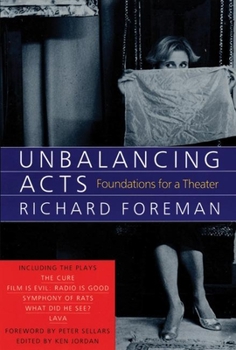Unbalancing Acts: Foundations for a Theater
Select Format
Select Condition 
Book Overview
Includes essays and playscripts: The Cure , Film Is Evil: Radio Is Good , Symphony of Rats , What Did He See? and Lava . Foreword by Peter Sellars This description may be from another edition of this product.
Format:Paperback
Language:English
ISBN:1559360763
ISBN13:9781559360760
Release Date:September 1993
Publisher:Theatre Communications Group
Length:368 Pages
Weight:1.06 lbs.
Dimensions:1.1" x 5.5" x 8.3"
Customer Reviews
1 rating
Foundation for a new theatre
Published by Thriftbooks.com User , 24 years ago
The opening essay, "Foundations For A Theatre," is the clearest and most linear statement to date of Richard Foreman's work, which re-considers the entire process of making theatre (from the formulation of a script to rehearsal to performance) and what kind of experience an evening of theatre may convey. No one is creating theatre like Richard Foreman, whose associative (and sometimes dissociative) writing process contrives to capture a truthful portrait of his own perception at work. In rehearsal, Foreman creates an environment rebelling against any mimetic presentation of everyday reality, which is a kind of shared dream. He uses every theatrical element at his disposal to surprise and dazzle the spectator, and bring awareness to our radical impulses before our intellects "understand" them (and change them into something else).Although his project sounds very cerebral, his theatre is very much about the senses, and his art grabs you on a gut level. The book includes several plays, though it might have been helpful to include a script without the production stage directions to help understand the way he generates a script. (A later book, MY HEAD WAS A SLEDGEHAMMER, does include this and it helps a great deal.) Also, more photographs and illustrations would support his essay on visual design and use of space.This artist is way ahead of his time, using theatre to address the process of perception itself rather than narrative thinking. The importance of this book, addressing this work to a general reader, may not be appreciated for quite some time.






